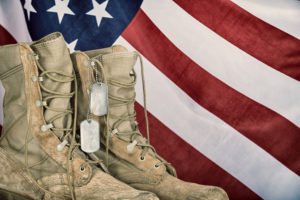In a perfect world, our military veterans would come home to well-paying jobs and would never have financial difficulties. Unfortunately, this is not always the case. Due to a variety of unique situations, it is more common than you may think for a military veteran to need to file bankruptcy. At The Law Offices of Paul Y. Lee we are proud to offer anyone in this situation a free legal consultation so they can first understand how their military service could impact their bankruptcy filing.
The two types of bankruptcy you should consider
Depending on your specific situation, you may want to file Chapter 7 or Chapter 13 bankruptcy. If you file Chapter 7 then you can sell off all nonexempt assets through a trustee. They sell the items and then pay your creditors directly. Your debt is then discharged and you can wipe out many types of debts including credit card bills, business debts, past-due utility bills, veterans assistance loans, and overpayments.
If you have a regular source of income then Chapter 13 may be the better option. It essentially involves the creation of a payment plan that allows you to pay back your debt in three to five years. You will be protected from creditor actions, such as wage garnishments and lawsuits, and as long as you stay on top of your payments, you will likely not pay the full amount of debt before it is considered taken care of.
If you have a home that you do not want to lose then Chapter 13 may be the best option. If you need to reorganize medical bills and other debts so that you can take care of them yourself, then Chapter 13 may be the best option.
Veterans may be eligible for specific exemptions
A person who has served in the military may be eligible for specific exemptions. For example, if they are getting VA disability then it will be exempt from the proceedings. Though it is considered income there is no tax paid on it and it is exempt from bankruptcy. However, note that certain states opt out of this.
When a person files for Chapter 7 bankruptcy they will be subjected to what is known as means testing which determines whether or not they are eligible for Chapter 7. However, disabled veterans may not have to go through means testing at all.
Finally, a veteran may qualify for a personal property exemption of as much as $60,000. The amount varies based on whether the veteran is filing individually or with a spouse. Note that this exemption is only available to a veteran who is filing bankruptcy as a direct result of their military service.
Do you have other questions about veterans filing bankruptcy? Do you want help from an experienced bankruptcy attorney? At The Law Offices of Paul Y. Lee we understand this can be a confusing process and we are here to offer you our support. Call us at 951-755-1000 for a free legal consultation.


